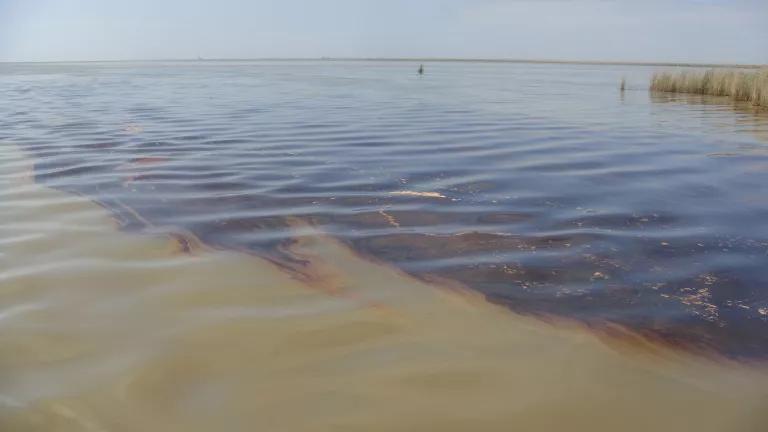Taxpayers Still on Hook for Oil and Gas Clean-up, Despite New Rule
BOEM's proposed rule falls short in requiring oil and gas companies to demonstrate they are financially able to fully remove and clean up platforms & pipelines.

Jeff Stapleton via Pexels
The Bureau of Ocean Energy Management (BOEM) recently issued proposed financial assurance regulations to strengthen requirements companies must meet to show that they are financially strong enough to cover the cost of decommissioning their oil and gas assets. In response to the proposed rule, a coalition of environmental NGOs, including NRDC, submitted a public comment to the agency arguing that the new requirements do not go far enough to protect taxpayers or our ocean environment.
Under existing decommissioning regulations, companies that extract fossil fuels from the seafloor must permanently plug oil wells, remove all platforms, clean up pipelines, and remove other obstructions from the ocean. BOEM requires oil and gas companies to pay bonds to the government in advance to ensure that money is available for decommissioning and clean-up if, for example, a company goes bankrupt before fulfilling its obligations.
But BOEM has historically failed to ensure that companies operating in the Gulf of Mexico are financially capable of covering the costs of cleanup and decommissioning. Bonding requirements have not been set high enough to cover costs, nor have they been adequately enforced. Also, BOEM has exempted many companies from paying supplemental bonding based on their demonstrated financial strength—yet many companies have declared bankruptcy before meeting their obligations. In fact, the agency reported in the proposed rule that there have been more than 30 corporate bankruptcies since 2009 involving offshore oil and gas companies with unbonded decommissioning liabilities. BOEM further revealed that these bankruptcies demonstrate the agency’s own rules for waiving supplemental bonding requirements were inadequate to protect the public from decommissioning costs. As a result of the agency’s weak rules and poor implementation of the law, the oil and gas industry has abandoned thousands of unplugged and inactive wells in federal waters, which will pose serious environmental risk and will cost billions of dollars to decommission.
When oil and gas companies do not fulfill their decommissioning obligations, the federal government—and ultimately, taxpayers—end up footing the bill for clean-up. The federal government has estimated that decommissioning such infrastructure in the Gulf of Mexico will cost around $42 billion. While the proposed regulation will help address this deficit, it does not adequately protect American taxpayers from covering the legal and financial obligations of oil and gas companies.
Our letter to BOEM urges the agency to strengthen the proposed rule in the following ways:
- Increase bonding requirements to ensure the highest likelihood that companies will pay for the full amount of estimated decommissioning liabilities. BOEM proposed three levels of required bonds and indicated a preference for the middle level. We urge BOEM to instead select the highest level of bonding to ensure that companies meet their obligations.
- Set a higher credit rating threshold for waiving supplemental financial assurances. The proposed regulation allows the agency to waive these assurances if an oil and gas company meets a certain credit rating. This proposed credit rating threshold is too low and should be increased to ensure that a company has a strong potential to meet its debt obligations.
- Do not use proxy credit ratings. The proposed rule also provides a loophole for companies that do not have a credit rating from a recognized credit rating agency. In those situations, BOEM proposed using a proxy credit rating based on the company’s audited financial statements. BOEM is not a financial agency and does not have capacity or expertise to design a financial review system. The agency should not allow risky companies to avoid their legal obligations.
- Consider a company’s record of violations and acts of non-compliance when determining supplemental bonding levels. The proposed rule allows for BOEM to ignore for example, the number of fines and violations a company was charged with for failing to uphold safety and environmental standards, when analyzing whether a company can fulfill its decommissioning obligations. A company’s compliance with its regulatory and contractual requirements in the past is some indication of whether the company will continue to violate the rules in the future.
- Prevent historic or current owners of abandoned or idle wells in federal waters from obtaining new leases. Recent studies have found that there are nearly 10,800 unplugged wells in federal waters of our ocean that will cost tens of billions of dollars to decommission, posing major financial and environmental risks. Companies who have not complied with decommissioning requirements in the past should not be awarded new leases until they meet their prior commitments. Irresponsible actors should not be allowed to engage in high-risk operations in our ocean.
Taxpayers should not be bailing out oil and gas companies—who made over $200 billion in profits in 2022—from their legal and contractual obligations. BOEM should hold corporations to high environmental and financial standards. If oil and gas companies do not have to provide sufficient financial assurances, then wealthy corporations will continue to abandon their platforms, rigs, and pipelines in our ocean. Abandoned, unplugged, and inactive oil and gas wells will continue to pollute our air and water and will cause harm to marine wildlife, our climate, and coastal communities.
NRDC and our partners urge the agency to require oil and gas companies to prove they are financially healthy enough to pay the full costs of decommissioning their assets in our ocean in compliance with the law. We ask that BOEM to issue a strong final financial assurances rule that will hold industry to its legal, financial, and ethical obligations.



